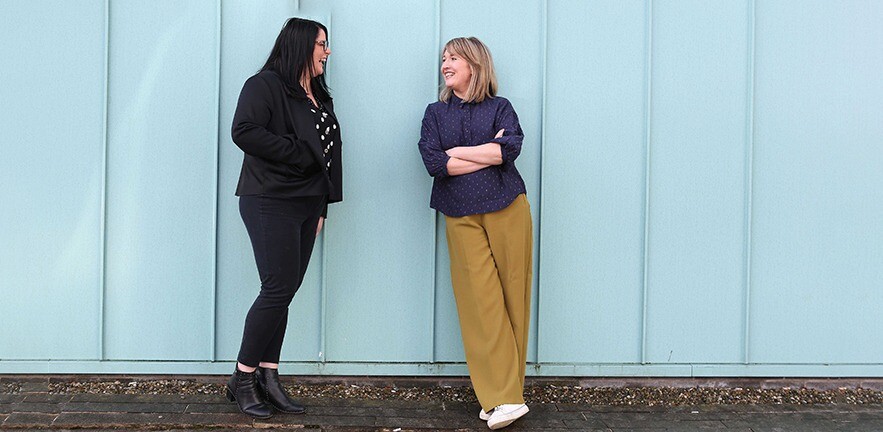Overview
Elemental Software’s online social prescribing platform helps the health, housing, local authority, prison, higher education, charity and voluntary sectors work together to connect people, build communities and improve lives. The leading platform of its kind in Ireland and the UK, co-founders Jennifer Neff and Leeann Monk-Ozgul hope to bring their evidence-backed intervention to Canada, Portugal and Finland too.
Social prescribing allows healthcare professionals to refer patients to local, non-clinical services which meet their wellbeing needs. These lifestyle interventions could include community gardening groups, creative writing or debt advice: the range of activities that patients can take part in depends on what’s available to them locally, which in turn is dependent on how local services work together.
Elemental Software tech-enabled service helps local organisations work together to offer joined up solutions that match patients’ wellbeing needs to their interests, and to track the impact of these interventions against public health data. The need for such a platform, as national governments, local authorities and other sectors involved in wellbeing come out of COVID-19 lockdown, is immense.

How does Elemental Software work?
Social prescribing was here to stay, even before COVID-19. In the UK, for example, its role in preventing a wide range of health conditions and improving health and wellbeing is highlighted as a priority for the future of healthcare in the NHS Long Term Plan.
Elemental Software’s cloud-based platform is designed by experts with hands-on experience working in one of Northern Ireland’s most socially deprived neighbourhoods. It makes it simple for health and wellbeing professionals to make, manage and monitor referrals into community activities and programmes. Doing so improves the health and wellbeing of those being referred, transforming their lives and creating more resilient communities. Its ability to enable these professionals to evaluate the impact of a referral, means that the health and wellbeing benefits of activities can be clearly demonstrated too.
As the coronavirus pandemic began to present unplanned challenges for community health and wellbeing professionals, Elemental Software swiftly enhanced capabilities to enable its customers to support more people, connect to more services and better evidence impact.
How did Elemental Software come into being?
Though founded as recently as 2016 by two former community development workers, Jennifer Neff and Leeann Monk-Ozgul, Elemental Software has been a work in progress since 2013.
Whilst both community workers, Jennifer and Leeann came from different, yet complimentary, sides of social and economic development: Leeann was a specialist in community health and wellbeing; Jennifer was a specialist in community digital skills and employability.
“We were consistently asking ourselves: How can we further reduce health inequalities?” says Leeann. “The answer became clear: by combining our skills to connect all stakeholders, giving anyone everywhere the ability to make, manage and monitor referrals into community activities and programmes.”
When Derry was awarded the first ever ‘UK City of Culture’ status in 2013, with a strong emphasis on anything being possible, Jennifer and Leeann pitched their idea to the TMED Health Challenge. They didn’t win. However, the winner, Professor Maurice Mulvenna, recognising their idea’s potential, gave them his prize money.
Armed with this £500 gift, Jennifer and Leeann have grown their idea into a company that employs 32 people and, as of July 2020, turns over in excess of £1 million. Jennifer and Leeann are widely recognised as social prescribing and population health experts. Leeann has been named as one of the most influential women in tech in Computer Weekly’s long list for four consecutive years, while Jennifer has delivered TED Talks and is a leading speaker at national and international healthcare conferences. Both regularly consult on the development of social prescribing strategy and practice. This includes being asked to make recommendations to health secretary, Matt Hancock on the future of social prescribing, and helping to develop the Mayor of London’s social prescribing vision.
What’s next?
Elemental, already the UK’s largest and most widely used digital social prescribing provider, aims to be world-changing.
“We aim to halt health inequalities by scaling the rollout and implementation of the social prescribing model of care, making it accessible for all who need it,” says Jennifer. “We will continue to develop practical, simple but effective tech solutions to connect communities to services and support that will improve their lives. We will continue to champion and lobby for social prescribing at a strategic level, sharing learning around effective models, partnerships and approaches too.”
Their plans include:
- launching new products
- extending functions to meet the needs of professionals in health, housing, the voluntary and community sectors, local government and prison care
- international growth.
“Integrating our technology with secondary care, community and housing systems and developing the use of analytics to enable professionals to estimate the cost savings of social prescribing to other public services, is top of our list,” says Jennifer.
Elemental pride themselves on being effective, making a difference and being fun to work with. Aiming to be an employer of choice in the tech for good sector, they plan to employ the best people in the industry to continue to develop services and expertise in technology and social prescribing.

